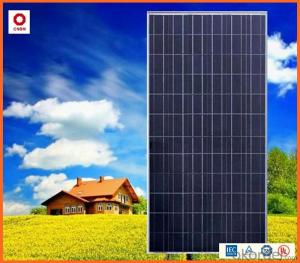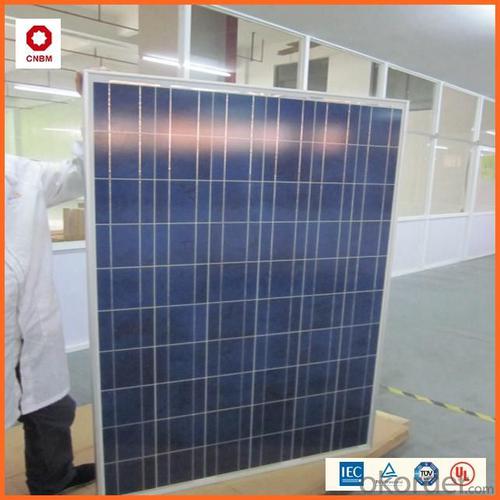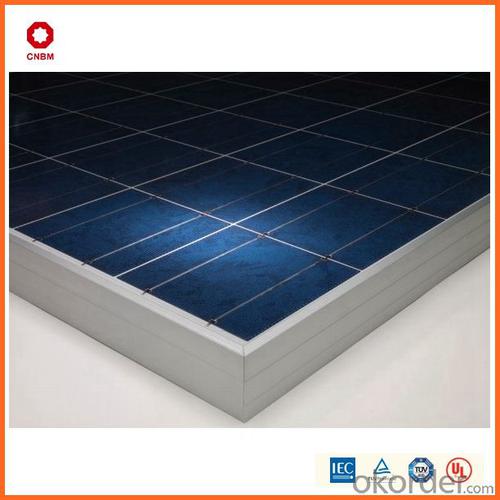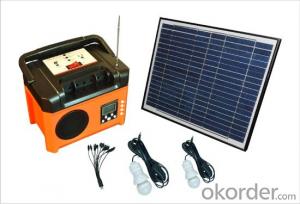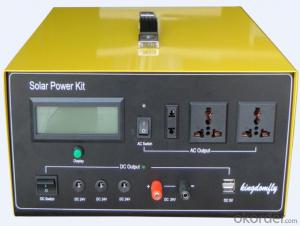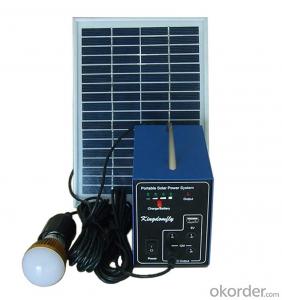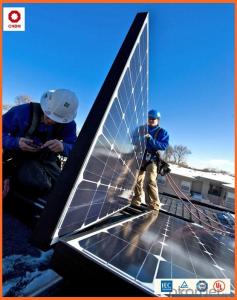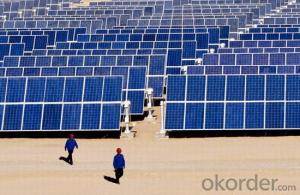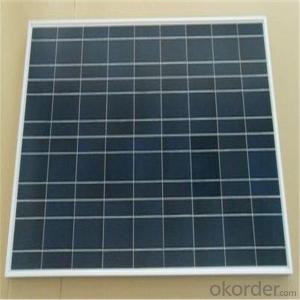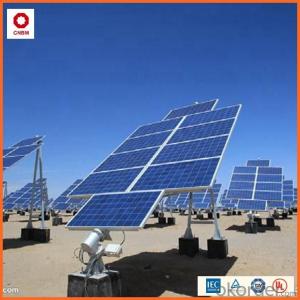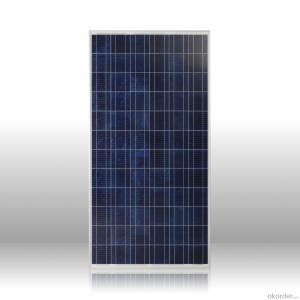Quality Solar Energy Systems - 300W Poly Solar Panel 0.46/W A Grade Good Quality
- Loading Port:
- China main port
- Payment Terms:
- TT OR LC
- Min Order Qty:
- 1 watt
- Supply Capability:
- 10000000 watt/month
OKorder Service Pledge
OKorder Financial Service
You Might Also Like
Product Description:
Hot Sale !!! Quality and Safety of 245w-320w Poly Solar Panel
1. Rigorous quality control meets the highest international standards.
2. High-transmissivity low-iron tempered glass, strong aluminium frame.
3. Using UV-resistant silicon.
4. IS09001/14001/CE/TUV/UL
Warranties of 245w-320w Poly Solar Panel
1. 10 years limited product warranty
2. 15 years at 90% of the minimal rated power output
3. 25 years at 80% of the minimal rated power output
Technical date of 245w-320w Poly Solar Panel
ITEM NO.: | Mono 125*125 cell ,36pcs . Power range from 80Wp-100Wp | ||||||||
Maximum Power(W) | 80 | 85 | 90 | 95 | 100 | ||||
Optimum Power Voltage(Vmp) | 17.81 | 17.89 | 17.94 | 17.99 | 18.06 | ||||
Optimum Operatige Current(Imp) | 4.78 | 4.91 | 5.12 | 5.35 | 5.59 | ||||
Open Circuit Voltage(Voc) | 21.98 | 22.05 | 22.14 | 22.28 | 22.45 | ||||
Short Circuit Current(Isc) | 4.95 | 5.15 | 5.36 | 5.65 | 5.84 | ||||
Solar Cell: | 125*125 Mono | ||||||||
Number of Cell(pcs) | 4*9 | ||||||||
Brand Name of Solar Cells | JA Cell, Bluesun Cell | ||||||||
Size of Module(mm) | 1580*808*35 | ||||||||
Caple & Connector Type | Pass the TUV Certificate | ||||||||
Frame(Material Corners,etc.) | Aluminium-alloy | ||||||||
Backing (Brand Type) | TPT | ||||||||
Cell Efficiency for 100W(%) | 15.8% | ||||||||
Weight Per Piece(KG) | 12.0KG | ||||||||
FF (%) | 70-76% | ||||||||
Junction Box Type | Pass the TUV Certificate | ||||||||
Tolerance Wattage(e.g.+/-5%) | ±3%, or 0-3% | ||||||||
Front Glass Thikness(mm) | 3.2 | ||||||||
Temperature Coefficients of Isc(%) | +0.04 | ||||||||
Temperature Coefficients of Voc(%) | -0.38 | ||||||||
Temperature Coefficients of Pm(%) | -0.47 | ||||||||
Temperature Coefficients of Im(%) | +0.04 | ||||||||
Temperature Coefficients of Vm(%) | -0.38 | ||||||||
Temperature Range | -40°C to +85°C | ||||||||
Surface Maximum Load Capacity | 2400Pa | ||||||||
Allowable Hail Load | 23m/s ,7.53g | ||||||||
Bypass Diode Rating(A) | 12 | ||||||||
Warranty | 90% of 10 years,80% of 25 years. | ||||||||
Standard Test Conditions | AM1.5 1000W/ 25 +/-2°C | ||||||||
Packing | carton or pallet | ||||||||
1*20' | 25 Pallets / 450pcs | ||||||||
1*40'STD | 25 Pallets / 100pcs | ||||||||
Features of our products:
• High conversion efficiency mono/poly-crystalline amorphous silicon solar cells
• Modules incorporate high performance bypass diodes to minimize the power drop caused by shading
• High transmittance, low-iron tempered glass
• High performance EVA encapsulant to prevent destroying and water.
• AI frame: without screw, corner connection. 8 holes on the frame can be installed easily
• Good performance of preventing from atrocious weather such as wind and hails
• Certifications: CE IEC TUV VDE UL, Class I
• 10 years 90% power output warranty

Shipping of 245w-320w Poly Solar Panel
By Sea | Delivery from Shanghai or Ningbo seaport |
By Air | Departure from Shanghai Pudong Airport |
By Express | Post by DHL, EMS, UPS, TNT. |
- Q: How do solar energy systems contribute to reducing carbon emissions?
- Solar energy systems play a crucial role in the reduction of carbon emissions through various means. Firstly, solar energy, being a renewable and eco-friendly power source, helps tackle this issue. By utilizing solar panels that convert sunlight into electricity without emitting any greenhouse gases, solar energy eliminates the release of carbon dioxide and other harmful pollutants into the atmosphere, a stark contrast to traditional fossil fuel power plants. Secondly, solar energy has the potential to replace the usage of fossil fuels in multiple sectors. For instance, residential rooftops can be fitted with solar panels to generate electricity for homes, reducing the dependence on coal or natural gas for power generation. Similarly, solar farms can be established to produce large-scale solar power for commercial and industrial purposes. By substituting fossil fuels, solar energy systems contribute to the reduction of carbon emissions associated with electricity generation. Furthermore, solar energy can also be utilized for heating purposes. Solar thermal systems can capture the sun's heat and provide hot water for residential and commercial buildings. By incorporating solar thermal systems, the demand for gas or electricity to heat water diminishes, resulting in a decrease in carbon emissions during the water heating process. Moreover, the widespread adoption of solar energy systems can lead to an overall decrease in the demand for fossil fuels. As more households, businesses, and industries transition to solar power, the need for coal, oil, and natural gas diminishes. Consequently, this reduced demand for fossil fuels can drive down their production and consumption, resulting in a significant reduction in carbon emissions associated with their extraction, refining, and combustion. In conclusion, solar energy systems contribute to the reduction of carbon emissions by producing clean and renewable electricity, replacing fossil fuels, reducing the demand for traditional energy sources, and providing an alternative for heating purposes. By embracing solar power, we can make substantial progress in combating climate change and strive towards a sustainable future.
- Q: Can a solar energy system power an entire home or business?
- Yes, a solar energy system can indeed power an entire home or business. With the right size and capacity of solar panels, combined with an efficient battery storage system, a solar energy system can generate and store enough electricity to meet the power demands of a residential or commercial property. Additionally, advancements in solar technology and energy management systems have made it easier to optimize solar energy usage and reduce reliance on the grid, making solar power a viable and sustainable solution for powering homes and businesses.
- Q: How often do solar panels need to be cleaned or maintained?
- Solar panels generally require minimal cleaning and maintenance. The frequency of cleaning depends on factors such as the location, weather conditions, and the level of dirt accumulation. In most cases, solar panels can be cleaned once or twice a year, while routine maintenance, such as checking for debris or damage, should be performed regularly.
- Q: Can solar energy systems be used for powering electric car wash systems?
- Solar energy systems have the capability to operate electric car wash systems. Utilizing photovoltaic panels, solar energy systems convert sunlight into usable electricity. This electricity can then be employed to power a variety of electrical devices, such as car wash systems. By strategically placing solar panels on the roof of a car wash facility or a nearby structure, the generated solar power can be directly harnessed to operate the electric motors, pumps, and other necessary equipment for a car wash system. This not only diminishes the dependence on traditional grid electricity but also aids in reducing operational expenses and minimizing the carbon footprint of the car wash facility. Moreover, solar energy systems have the ability to store surplus energy in batteries, ensuring uninterrupted operation even during periods of limited sunlight or at night.
- Q: How does the efficiency of solar panels affect a solar energy system?
- The efficiency of solar panels directly impacts the overall performance and cost-effectiveness of a solar energy system. Higher efficiency panels can generate more electricity from the same amount of sunlight, allowing the system to produce more power. This can result in a higher return on investment and shorter payback periods. Additionally, more efficient panels require less space, making them suitable for installations where space is limited. Conversely, lower efficiency panels may require more space and installation costs to achieve the desired energy output. Therefore, the efficiency of solar panels plays a crucial role in optimizing the performance and economic viability of a solar energy system.
- Q: How do solar energy systems affect air pollution?
- Solar energy systems have a positive impact on air pollution as they produce electricity without emitting harmful pollutants or greenhouse gases. By replacing conventional fossil fuel-based power plants, solar energy systems help reduce air pollution and improve air quality, leading to a cleaner and healthier environment.
- Q: Can solar energy systems be used in powering recreational facilities like gyms or spas?
- Yes, solar energy systems can definitely be used to power recreational facilities like gyms or spas. In fact, many gyms and spas are already utilizing solar energy as a sustainable and cost-effective solution for their power needs. Solar panels can be installed on the roof or in the vicinity of the facility to capture sunlight and convert it into electricity. This clean and renewable energy source can then be used to power various equipment such as lighting, air conditioning, heating, and other electrical systems within the gym or spa. By incorporating solar energy systems, recreational facilities can significantly reduce their reliance on traditional energy sources, such as fossil fuels. This not only helps to reduce carbon emissions and combat climate change but also provides long-term financial benefits. Solar power can result in substantial energy savings over time, as gyms and spas can generate their own electricity and potentially even sell excess power back to the grid. Moreover, solar energy systems can be seamlessly integrated into the design of recreational facilities. The sleek and modern look of solar panels can enhance the overall aesthetic appeal of the facility, while also demonstrating its commitment to environmental sustainability. This can attract environmentally conscious customers who value businesses that prioritize renewable energy and contribute to a greener future. In summary, solar energy systems are a viable and increasingly popular option for powering recreational facilities like gyms or spas. By harnessing the power of the sun, these facilities can reduce their carbon footprint, save on energy costs, and attract environmentally conscious customers.
- Q: What is the role of solar energy in achieving energy independence?
- The role of solar energy in achieving energy independence is crucial. Solar power is a renewable and abundant source of energy that can be harnessed to generate electricity and heat. By utilizing solar energy, nations can reduce their reliance on fossil fuels and imported energy sources, thereby achieving greater energy independence. Solar panels installed on rooftops, in fields, and in solar farms can produce clean and sustainable electricity, reducing the need for traditional power plants. Additionally, solar energy can be utilized in off-grid areas, allowing communities to generate their own power and become self-sufficient. Overall, solar energy plays a vital role in diversifying energy sources, reducing greenhouse gas emissions, and ensuring a more sustainable and independent energy future.
- Q: Can solar energy systems be used in powering wastewater treatment plants?
- Solar energy systems have the capability to power wastewater treatment plants. This clean and renewable source of electricity can be harnessed through the utilization of solar panels, which capture sunlight and convert it into usable power for the various processes within a wastewater treatment facility. There are several advantages to employing solar energy systems in the operation of wastewater treatment plants. Firstly, solar power is abundant and accessible in most regions, making it a dependable energy source. This reduces reliance on fossil fuels and helps mitigate the environmental impact associated with conventional energy sources. Additionally, solar energy systems require minimal maintenance and have low operational costs compared to traditional power sources. Once the initial investment in solar panels is made, ongoing expenses are significantly reduced, resulting in long-term cost savings. Moreover, solar-powered wastewater treatment plants contribute to the reduction of greenhouse gas emissions. By transitioning to renewable energy, these facilities can greatly decrease their carbon footprint and aid in the fight against climate change. Furthermore, solar energy systems can be easily integrated into existing wastewater treatment plants, powering vital components such as pumps, motors, and aeration systems necessary for the treatment process. However, it is crucial to consider the specific energy requirements of each wastewater treatment plant when implementing solar energy systems. The size and capacity of the solar panels must be carefully determined to ensure consistent generation of sufficient electricity to meet the plant's needs. In conclusion, solar energy systems are indeed capable of powering wastewater treatment plants. They offer numerous benefits including cost savings, reduced environmental impact, and seamless integration. As the world continues to prioritize sustainable energy solutions, solar-powered wastewater treatment plants are gaining popularity and are a significant step towards a greener and more sustainable future.
- Q: Can solar energy systems be used for powering food processing or packaging plants?
- Yes, solar energy systems can be used for powering food processing or packaging plants. Solar energy systems, such as photovoltaic panels, can generate electricity from the sun's rays. This electricity can then be used to power various processes and machinery in food processing or packaging plants. Food processing and packaging plants typically require a significant amount of energy to operate their machinery, lighting, refrigeration, and other systems. By utilizing solar energy, these plants can reduce their dependence on fossil fuels and lower their carbon footprint. Solar energy systems can be installed on the rooftops or open spaces near the food processing or packaging plants. The energy generated by these systems can be directly used or stored in batteries for later use. In some cases, excess energy can even be sold back to the power grid, providing an additional source of revenue. While the initial setup cost of solar energy systems can be high, the long-term benefits outweigh the expenses. Solar energy is a renewable and clean source of power, reducing the reliance on non-renewable resources and minimizing greenhouse gas emissions. Furthermore, solar energy systems can be integrated with energy-efficient technologies such as LED lighting, energy management systems, and heat recovery systems to further enhance the overall efficiency of food processing or packaging plants. In summary, solar energy systems are a viable and sustainable option for powering food processing or packaging plants. They offer numerous benefits, including reduced operational costs, lower environmental impact, and increased energy independence.
Send your message to us
Quality Solar Energy Systems - 300W Poly Solar Panel 0.46/W A Grade Good Quality
- Loading Port:
- China main port
- Payment Terms:
- TT OR LC
- Min Order Qty:
- 1 watt
- Supply Capability:
- 10000000 watt/month
OKorder Service Pledge
OKorder Financial Service
Similar products
Hot products
Hot Searches
Related keywords
